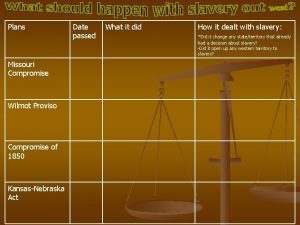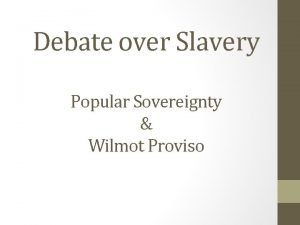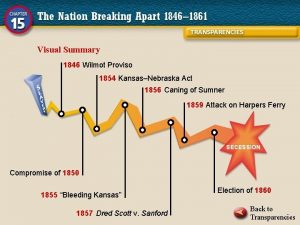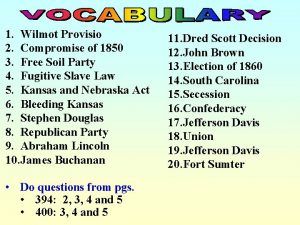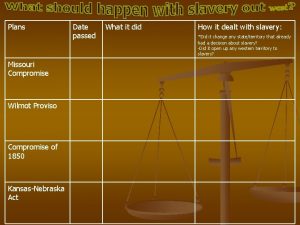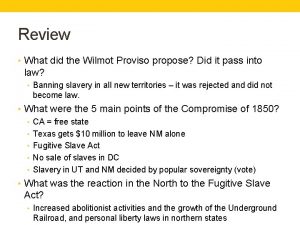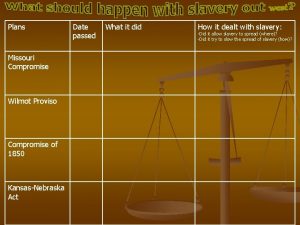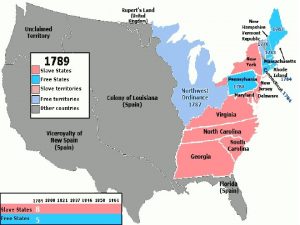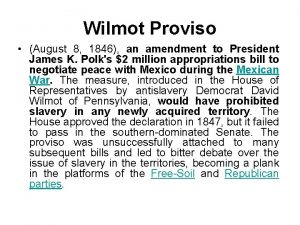The Wilmot Proviso Concern over Polks ProSouth policy











- Slides: 11

The Wilmot Proviso Concern over Polk’s Pro-South policy

David Wilmot • Democrat Member of the House of Representatives from Pennsylvania (Northern, Free State). • Not an abolitionist. • Proposed that none of the territory taken from Mexico in the War should be open to slavery. • This Proviso (condition) was an amendment (add on) to a finance bill

Why? • Polk seemed to be pursuing as much territory in the South as possible in the War with Mexico. • Meanwhile in the North he had not fulfilled his promise to take the whole of Oregon and instead had agreed a boarder on the 49 th parallel.

Why? • The deal with Britain over Oregon was a good one for the USA. It prevented a conflict that the USA could not afford as it was already at war with Mexico. • For Northern Democrats like Wilmot, however, Polk’s seemingly pro-Southern policy was an issue with mid term elections coming up. The Democrats were starting to look like a party of the South.

Reaction • There was a great deal of anger from Southern Congressmen from both the Democrat and Whig party. • Every Southern Democrat and all but two Southern Whigs voted against it. • The Northern Congressmen supported the Proviso and it passed in the House of Representatives by 83 votes to 64

Reaction • The Proviso failed to pass in the Senate. • Toombs of Georgia (Member of the House of Representatives and later Senator) went as far as to say he would prefer disunion rather than the ‘degradation’ of the South not having the same rights to the territories as the North. • Northern state legislatures endorsed it. • Southern state legislatures denounced it.

Primary Sources • Provenance • Content Argument • Emphasis/ Tone

Wilmot Proviso 12 th August 1846 • Provided, That, as an express and fundamental condition to the acquisition of any territory from the Republic of Mexico by the United States, by virtue of any treaty which may be negotiated between them, and to the use by the Executive of the moneys herein appropriated, neither slavery nor involuntary servitude shall ever exist in any part of said territory, except for crime, whereof the party shall first be duly convicted.

Northern Democrat • ‘The administration is Southern, Southern! Since the South have fixed boundaries for free territories, let the North fix boundaries for slave territories’

Wilmot • “So dangerous do I believe the spirit and demands of Slave Power, so insufferable its arrogance, if I saw the way open to strike an effectual and decisive blow against its domination at this time, I would do so, even at temporary loss of other principles”

Mr. Calhoun’s Resolutions, submitted in the Senate of the United States, February 1, 1847 • Resolved, That the territories of the United States belong to the several States composing this Union, and are held by them as their joint and common property. Resolved, That Congress, as the joint agent and representative of the States of this Union, has no right to make any law, or do any act whatever, that shall directly, or by its effects, make any discrimination between the States of this Union, by which any of them shall be deprived of its full and equal right in any territory of the United States, acquired or to be acquired

